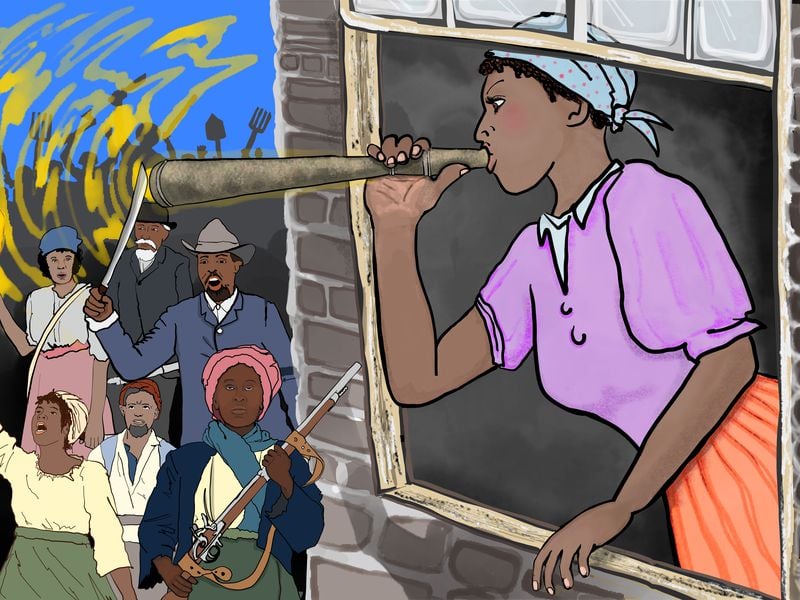To kick off #BlackHistoryMonth  , we are highlighting an incredible moment in Lancaster County history: The Christiana Resistance; when a community of free black men and women defended themselves against a posse of slave-catchers.
, we are highlighting an incredible moment in Lancaster County history: The Christiana Resistance; when a community of free black men and women defended themselves against a posse of slave-catchers.
 , we are highlighting an incredible moment in Lancaster County history: The Christiana Resistance; when a community of free black men and women defended themselves against a posse of slave-catchers.
, we are highlighting an incredible moment in Lancaster County history: The Christiana Resistance; when a community of free black men and women defended themselves against a posse of slave-catchers.
The Fugitive Slave Act of 1850 required all people to assist in the capture and return of African Americans who had escaped slavery. During this time, many fleeing bondage crossed the Mason-Dixon line into Lancaster seeking refuge. Samuel Thompson and Joshua Kite were among them.
The men were welcomed into the Christiana home of William and Eliza Parker. William had escaped slavery years earlier, and, along with his wife, was the leader of a mutual aid community of formerly-enslaved African Americans living in the area.
The area had been raided by slave-catchers for decades and the group had built up a robust network for self-defense.
Under the Fugitive Slave Act, many white Pennsylvanians were assisting in and profiting from the capture of escaped African Americans.
Under the Fugitive Slave Act, many white Pennsylvanians were assisting in and profiting from the capture of escaped African Americans.
The Maryland slaver Edward Gorsuch was informed that four of his enslaved men, including Thompson and Kite, had escaped from his land. He obtained a warrant from their capture and gathered an armed posse, including US Marshall Henry Kline, 2 police officers, and other family.
A group out of Philadelphia called The Special Secret Committee caught wind of impending raid. Samuel Williams, a member of the committee, warned the Christiana community that Gorsuch was coming.
On September 11, 1851 the posse arrived at the house with their guide a discussion ensued. Parker refused to give up the men or acknowledge the legal authority of the group.
At this time, William's wife Eliza Parker blew a horn to sound the signal to the surrounding community that reinforcements were needed (pictured, from Smithsonian Mag https://www.smithsonianmag.com/.../how-humble-stone.../).
Gorsuch's posse then fired on Eliza, who continued to sound the alarm.
Gorsuch's posse then fired on Eliza, who continued to sound the alarm.
A large group of armed black men (75-150) and some white Quakers from the area arrived on the scene. The Quakers, most notably Castner Hanway, implored the slave-catchers to leave. The Quakers also tried to prevent any violence, begging members of the community not to shoot back.
Kline and others suggested that the group retreat to get reinforcements, but Gorsuch stubbornly refused.
When Gorsuch confronted Samuel Thompson, Thompson clubbed him over the head. Gorsuch was attacked, shot, and killed. His son and others were injured, while some fled.
When Gorsuch confronted Samuel Thompson, Thompson clubbed him over the head. Gorsuch was attacked, shot, and killed. His son and others were injured, while some fled.
At least one other man from Gorsuch's posse died later from his injuries.
Parker and those he was sheltering fled to the Rochester, New York home of Frederick Douglass, whom Parker new when they were both enslaved in Maryland. They eventually fled to Canada.
Parker and those he was sheltering fled to the Rochester, New York home of Frederick Douglass, whom Parker new when they were both enslaved in Maryland. They eventually fled to Canada.
A total of 41 men were charged with 117 counts of treason-the largest number of Americans to be charged with treason to this day. Thaddeus Stevens provided defense for some of those charged. Despite much protest, all charged were acquitted. No one was convicted in Gorsuch's death
The political aftermath of the resistance saw many white Pennsylvanians blame abolitionists for the violence at Christiana. Many politicians, including Thaddeus Stevens, lost their seats as a result of their abolitionist views.
James Buchannan's career was propelled by his pro-slavery stance.H e was elected president in 1856. Gorsuch's school friend, John Wilkes Booth, vowed revenge for his death. Violence continued to escalate along the Pennsylvania-Maryland border, spurred by angry, pro-slavery whites
Thaddeus Stevens eventually regained his seat as support grew in Lancaster for the Union cause. Eliza Parker and her children joined William in Canada.
https://explorepahistory.com/hmarker.php?markerId=1-A-109&fbclid=IwAR0d1Selc0jriCHUQrzHsPJJCGP9MejP_1-19uewNiZwYHEX5QjO0do4EN0
http://undergroundrroriginspa.org/wp-content/uploads/2017/04/Resistance.Christiana-MU-Vasellas-Ed.4-17-17-.pdf?fbclid=IwAR1iwaR1PQu9pFLnH5hUUQi8sxbWizM9QohRCjwY25jHLbYg_wyoW8967DY
https://explorepahistory.com/hmarker.php?markerId=1-A-109&fbclid=IwAR0d1Selc0jriCHUQrzHsPJJCGP9MejP_1-19uewNiZwYHEX5QjO0do4EN0
http://undergroundrroriginspa.org/wp-content/uploads/2017/04/Resistance.Christiana-MU-Vasellas-Ed.4-17-17-.pdf?fbclid=IwAR1iwaR1PQu9pFLnH5hUUQi8sxbWizM9QohRCjwY25jHLbYg_wyoW8967DY

 Read on Twitter
Read on Twitter


